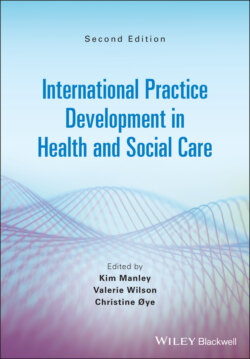Читать книгу International Practice Development in Health and Social Care - Группа авторов - Страница 42
Co‐production – collective ownership
ОглавлениеCo‐production is advocated as an effective and efficient method of service improvement. It can help with problem‐solving, resource utilisation, decision‐making and improving relationships between those who use services and those who provide them. There are many examples of its use from across the spectrum of health and social care with great success. The principles of PD explicitly lean towards making co‐production a success.
We have used the facilitation tools described above to host a number of collaborative co‐production events bringing together two expert groups, providers and recipients of care who learn and co‐create together (Realpe and Wallace 2010), leading to the development of effective partnerships. We solved wicked problems such as smoking cessation in pregnancy through to undertaking a full‐service evaluation via the lens of women, families and staff. Sense checking our governance systems, what we think we are doing well and where we think we need to improve and align that with where women and frontline staff feel these priorities lie. This approach has led to several simple but effective quality improvement measures, which improved feedback from staff and women. For example, ear plugs for partners to get a good night’s sleep through to myth busting about women not wanting to engage with video consultation when in fact we found they were enthusiastic about it. This change in resource utilisation led to a reduction in waiting times in our diabetic clinics.
Staff told us that they felt empowered by actively evaluating and making changes to improve their service. Those in managerial and formal leadership positions also benefited as they explicitly enabled staff to make changes, which resulted in them practising with a collaborative, transformative leadership style.
PD facilitates us to keep a critical eye on how co‐productive we are during every interaction and decision made which, directly or indirectly, affects patients. The clinical experience should be an act of active co‐production, an opportunity for the two expert groups to make sense of the words used and to bridge the gaps between their thinking. This collaborative effort can help them reach a joint understanding and creates appreciation on both sides for possible or desirable future action: a co‐produced care plan or new service pathway. PD tools can support us to do this all the time.
It requires users to be experts in their own circumstances and capable of making decisions, whilst as professionals we must move from being fixers to facilitators. To be truly transformative, co‐production requires a relocation of power towards service users. This necessitates new relationships with us as frontline professionals who through training in PD can use the tools to be empowered to take on these new roles. Here we describe how you can overcome the many challenges of generating system‐level change from the ground up.
